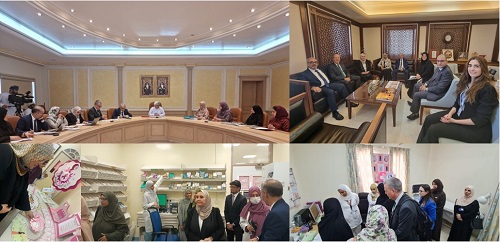
Muscat, January 2023 – Noncommunicable diseases (NCDs) pose a major global public health concern. In Oman, cardiovascular diseases, chronic respiratory diseases, cancer, and diabetes are responsible for 83% of total deaths related to NCDs, with factors such as physical inactivity, malnutrition and tobacco use contributing to an increasing risk of NCDs.
In Oman, there has been a major increase in obesity among all ages, with a high prevalence of risk factors, including hypertension and dyslipidemia. Additionally, data on the prevalence of asthma from a 2013 study, reported 7.3% prevalence in adults and 12.7% in children (among 95% of both adults and children using government health care facilities). In 2019, cancer was the third leading cause of death, with a total of 2307 diagnosed cases. Breast cancer represents 12.8% of all cancers and 21.2% of cancers that affect women; 33% of patients are diagnosed with breast cancer at a late stage.
In January 2023, WHO conducted a 4-day mission to Oman to follow up on progress and development of an NCD surveillance system. Several visits were conducted to NCD clinics in primary health care (PHC) facilities in Muscat and South-Batinah governorates to observe existing NCD health care services, including for the management of asthma, diabetes, hypertension, cancer and other diseases, such as hyperlipidemia and thyroid diseases.
In addition, meetings were conducted to discuss the roles of various stakeholders and to advocate for the breast screening programme at PHC level. Several visits to PHC facilities and a tertiary hospital, in Muscat and Al Dakhliya governorate, were conducted to obtain an overview of screening services, discuss challenges and future plans, assess the screening programme at primary and tertiary levels, and observe the workflow at the mammography unit and surgery department.
The mission team also visited Oman’s main tertiary hospital (the Royal Hospital) to meet with relevant departments and specialized centres providing NCD services. Two specialized entities, including the chest department and the National Diabetic and Endocrine Center, are currently working on establishing a WHO collaborating centre for asthma and diabetes.
Dr Jean Jabbour, WHO Representative to Oman, reiterated Oman's commitment to the 2030 Agenda for Sustainable Development, “WHO, with all partners, plays a key role in the coordination and promotion of the global fight against NCDs. In Oman, the Ministry of Health in addressing the burden of asthma and has established a chronic respiratory disease programm. There are 161 asthma clinics in PHC facilities, accounting for 65% of the total number of PHC facilities. The mission is also working on developing WHO collaborating centres for asthma and diabetes in the Region. Our collective efforts will have a great impact on preventing and managing NCDs.”
The mission concluded with a stakeholder meeting in which all relevant parties convened to discuss their respective role in the monitoring of NCD indicators to ensure effective monitoring and evaluation of Oman’s progress in achieving national and international targets moving forward.








